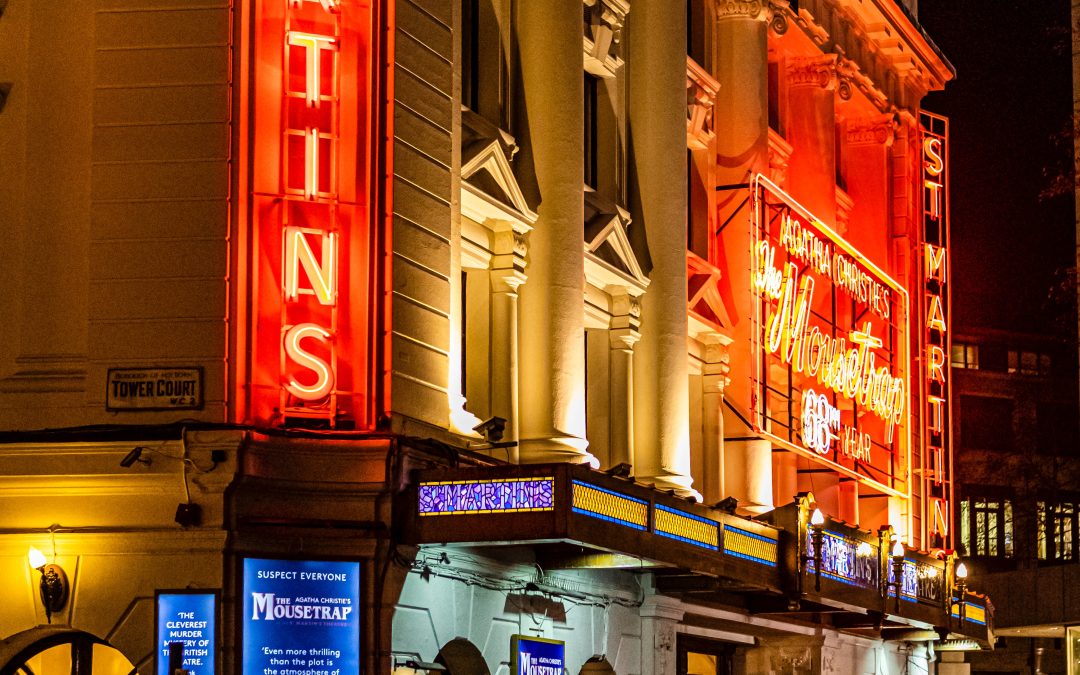In case you haven’t heard, we celebrated a very special Platinum Jubilee in the UK this year, that of our wonderful monarch Queen Elizabeth II who has ruled the Commonwealth since 1952.
What you might not be so familiar with, however, is the fact that this year marks another 70th year anniversary. It marks a milestone for another Queen. The undisputed ‘Queen of Crime’ – Dame Agatha Christie.
Best known for her 66 detective novels and characters including Hercule Poirot and Miss Marple, Agatha holds the record for writing the longest running play on the West End.
The Mousetrap had its West End debut at The Ambassador Theatre in November 1952 after a short pre-London tour and has been running continually ever since for 70 years (not counting its forced closure due to Covid).
Not a bad run considering Agatha herself, as documented in her autobiography, believed it would only run for eight months.
We’re celebrating the milestone with a ‘The Mousetrap’ Platinum Jubilee Tour in October that includes tickets to see the play (of course), combined with an immersive Murder Mystery dining experience aboard a 1920’s-themed train, an Agatha Christie walking tour of London and a decadent afternoon tea in a 5* hotel.
But we thought we’d share a few interesting facts you might not know about the most enduring of West End plays.
Did you know…
- The play began life as a short radio play written as a birthday present for Queen Mary, the consort of King George V. It was broadcast on 30 May 1947 under the name Three Blind Mice starring Barry Morse.
- The story has still not been published within the United Kingdom by request of Agatha Christie. She stated it should not be published as long as it ran as a play in the West End of London.
- It has appeared, however, in the United States in the 1950 collection Three Blind Mice and Other Stories.
- When she wrote the play, Christie gave the rights to her grandson Mathew Prichard as a birthday present.
- In the UK, only one production of the play in addition to the West End production can be performed annually and under the contract terms of the play, no film adaptation can be produced until the West End production has been closed for at least six months.
- The play had to be renamed at the insistence of Emile Littler who had produced a play called Three Blind Mice in the West End before the Second World War.
- In 1997, at the initiative of producer Stephen Waley-Cohen, the theatrical education charity Mousetrap Theatre Projects was launched, helping young people experience London’s theatre.
- Christie herself did not expect The Mousetrap to run for such a long time. In her autobiography, she reports a conversation that she had with Peter Saunders: “Fourteen months I am going to give it”, says Saunders. To which Christie replies, “It won’t run that long. Eight months perhaps. Yes, I think eight months.”
- When it broke the record for the longest run of a play in the West End in September 1957, Christie received a telegram from fellow playwright Noël Coward, stating: “Much as it pains me I really must congratulate you …”
- This letter was only found in 2011, by a Cotswold furniture maker who was renovating a bureau purchased by a client from the Christie estate.
- By the time of Christie’s death in 1976, the play had made more than £3 million.[10]
- The original West End cast included Richard Attenborough as Detective Sergeant Trotter and his wife Sheila Sim as Mollie Ralston.
- Mysie Monte and David Raven each made history by remaining in the cast for more than 11 years, in their roles as Mrs Boyle and Major Metcalf.
- Since they left, the cast has been changed annually. The change usually occurs around late November around the anniversary of the play’s opening, and was the initiative of Sir Peter Saunders, the original producer.
- There is a tradition of the retiring leading lady and the new leading lady cutting a “Mousetrap cake” together.
- The play has also made theatrical history by having an original “cast member” survive all the cast changes since its opening night. The late Deryck Guyler can still be heard, via a recording, reading the radio news bulletin in the play to this present day.
- The set was changed in 1965 and 1999, but one prop survives from the original opening – the clock which sits on the mantelpiece of the fireplace in the main hall.


